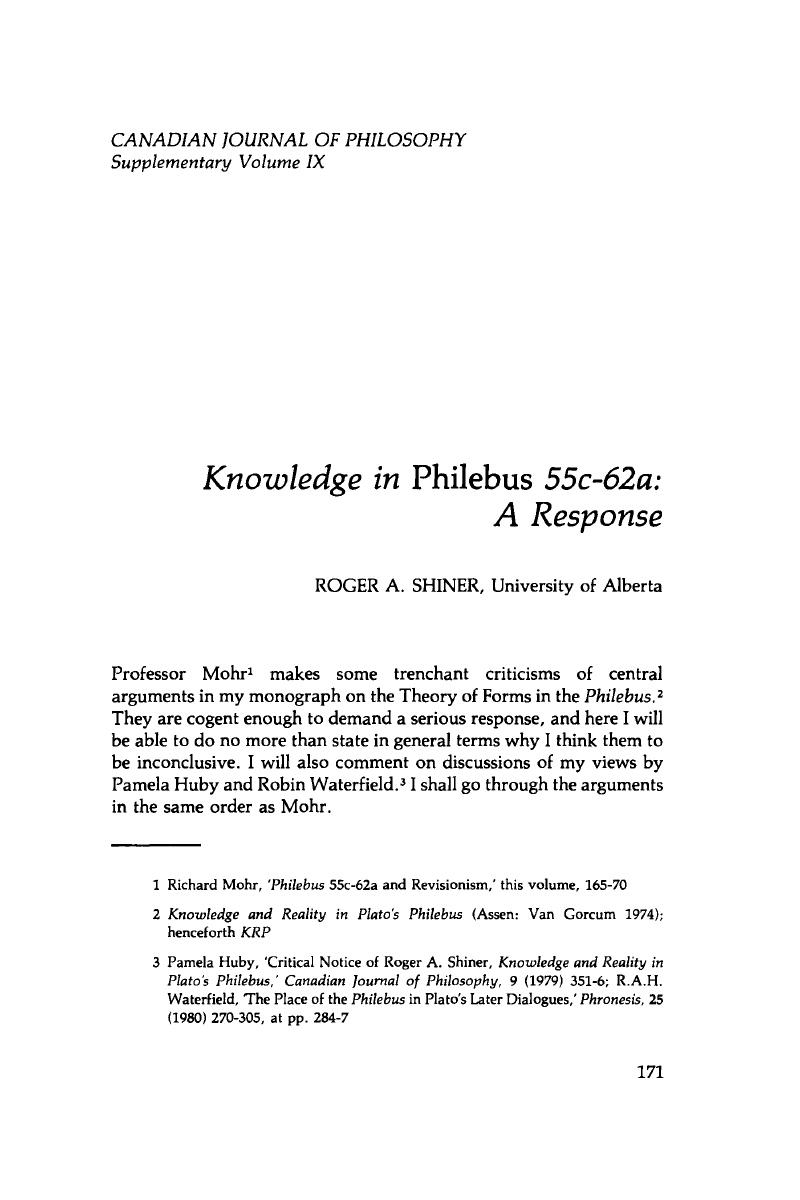No CrossRef data available.
Article contents
Knowledge in Philebus 55c-62a: A Response
Published online by Cambridge University Press: 01 January 2020
Abstract

- Type
- Reply
- Information
- Canadian Journal of Philosophy Supplementary Volume , Volume 9: New Essays on Plato , 1983 , pp. 171 - 183
- Copyright
- Copyright © The Authors 1983
References
1 Richard Mohr, ‘Philebus 55c-62a and Revisionism,’ this volume, 165-70
2 Knowledge and Reality in Plato's Philebus (Assen: Van Gorcum 1974); henceforth KRP
3 Pamela Huby, ‘Critical Notice of Shiner, Roger A., Knowledge and Reality in Plato's Philebus,’ Canadian Journal of Philosophy, 9 (1979) 351-6Google Scholar; Waterfield, R.A.H., ‘The Place of the Philebus in Plato's Later Dialogues,’ Phronesis, 25 (1980) 270–305CrossRefGoogle Scholar, at pp. 284-7
4 Huby appreciates this part of my argument very well (351-2), and I am grateful to her for that.
5 The original claim that Plato had an official doctrine of mathematical intermediates is made by Aristotle (Metaph. 987b). Dispute about the accuracy of Aristotle's testimony is one of the longest-running shows in town, having been going on at least since Proclus. The Appendix to this paper notes briefly the current state of the play. I am grateful to Alexander Mourelatos and Alan Bowen for bibliographic advice. See also Michael Morgan's paper in this volume, pp. 83-99.
6 Huby on p. 354 seemingly both offers mathematical intermediates to me to deal with one objection and denies them to me to deal with another. She suggests, however, that θϵία used of the ideal circle of the geometer, equivalent neither to the Form nor the circle on the blackboard, is ironical (ibid.) - thus implying that Plato could accept such ideal circles and also yet not have a fullscale doctrine of mathematical intermediates as part of the TTF. Generally speaking, I am very leery of interpretations which require Platonic uses of technical terminology to be ironic - never mind Socratic irony and Plato's mastery of dramatic style. Systematic irony I might tolerate, but hypotheses proposing piecemeal irony are uneasily ad hoc. She also suggests I give too much away at 62a3 and a8, in implying that ƛόγον ἔχων means ‘having an account’ in a sense with ontological commitment, if not the ontological commitment of the TTF. She points out the phrase can well mean simply ‘able to reason about.’ But, as she acknowledges (ibid.), Plato seems committed by the contrast at 62a3 to a systematic distinction between ƛόγον ἔχων, ‘able to reason,’ and νοϵῖν, ‘understanding,’ and I am not at all sure that is a good thing. It may fit well Aristotle's philosophy of science, but it is much less clearly a Platonic distinction.
7 Waterfield (287 and 303, f-n 57) seems to have misunderstood this part of my argument in KRP. I do say, as he says I do, that γένϵσιζ and οὐσία in Phlb 53-55 are ‘far wider in their extension than the Form/Particular distinction of the middle dialogues’ (KRP 52). But I say this in the spirit of acknowledging that Phlb 53-55 may be a metaphysical usage which comprehends, rather than rivals or excludes, the TTF, or that it may not be a metaphysical usage at all. If I understood him aright, Waterfields's view is much the same; I do not see any difference between us.
8 This issue is at the core of my exchange in the Journal of the History of Philosophy with Robert Fahrnkopf. See Mohr, f-n 2, p. 166 for references.




